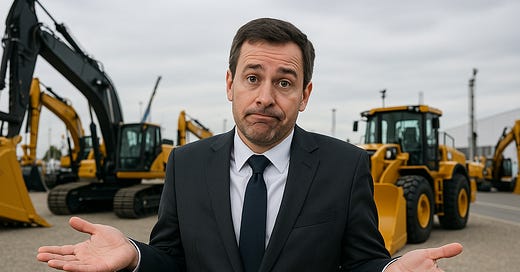Confusion reigns at Bauma 2025
Amidst all the talk of technology, electric machines, hydrogen machines and autonomous machines, there is one subject that no-one dares address. US tariffs.
There is nothing that can upset the global economic apple cart quite like uncertainty. Wars and conflicts can send a shudder around the world. A ship running aground in the Suez Canal can cause economists to glance over their shoulders with collective suspicion and concern. But uncertainty? That never fails.
And rarely have I witnessed uncertainty writ quite so large and quite so universally as I have this week at the global construction equipment exhibition, Bauma.
Bauma is the largest exhibition in the entire world; a massive machine Mecca in Munich that attracts exhibitors and visitors from across the globe. The show only takes place once every three years and, as such, it acts as a barometer for both industry and economic sentiment.
Yet this outing of the exhibition has been overshadowed; not by the machinations of economists; not by discussions surrounding whether electric or hydrogen will become the industry’s fuel of choice when diesel is finally sidelined; and not even by the industry’s desperate rush towards its goal of zero emissions. Rather, Bauma 2025 has been overshadowed by a single man and a single word. That man is US president Donald Trump; and that word is tariffs.
The construction equipment sector is a mature and global industry valued at around $150 billion per year. Ahead of such an important exhibition, those responsible for manning the stands and booths have been briefed and media trained to field probing questions from journalists; and to prepare them for interactions with existing customers, prospective customers; and even customers that are disgruntled about something.
Yet, for all that training and all that preparation, a mention of that dread word “tariffs” was met - continually and consistently - with shrugs of resignation and a simple phrase: “I don’t know”. I don’t know how this will impact sales of equipment to the US. I don’t know what this means for sales of American-built equipment around the world; and - most telling of all - I don’t know if this is real. Even those tempted to take a shot in the dark and guess how all this might play out knew that, even if their guess was accurate at the point of utterance, it would likely be rendered foolish or meaningless the next time Donald Trump found himself near a media microphone.
Trump’s on/off campaign of “reciprocal” tariffs - which has extended to islands inhabited only by penguins and yet - curiously - not to Russia - has done what no other crisis has ever managed. It has left even the most unflappable in a flap.
Back in 2010, the eruption of the Icelandic Eyjafjallajökull volcano threw a dust cloud into the atmosphere that brought air travel to a standstill and prevented a good many people making the trek to the Messe Munchen for that year’s Bauma show. The show carried on regardless. In 2022, with the world still emerging from the COVID-19 pandemic, the show again prevailed (although it did take place roughly six months later than usual). The 2025 outing of the show went ahead as planned, of course. But where 2010 and 2022 triggered a Dunkirk-spirit style resilience, Bauma 2025 has been characterised by a new paradigm in which what was once certain is now uncertain. And, like national governments when COVID first hit, the construction equipment industry finds itself wrestling with an issue for which there is no playbook. The industry is notoriously cyclical; rising and falling with the economic tides. These, however, are uncharted economic waters. We know that the winds of change originated in the US, but no-one seems to have any idea which way those winds are blowing.
As a result, it is all but impossible to take an accurate reading of the construction equipment industry’s pulse. The aisles were brimming with people; the technology on display was nothing short of awe-inspiring; and it is clear that the sector is still chipping away as it carves a carbon-free future. But none of that will matter if this vital sector runs aground upon the jagged rocks of Trump’s man-made tariff reef.
Ask me how the industry is doing based on sentiment in the Bauma aisles, and I’ll give you the same answer I received when I asked countless people what tariffs might mean for them. “Honestly? I don’t know.”





